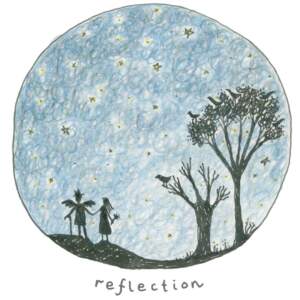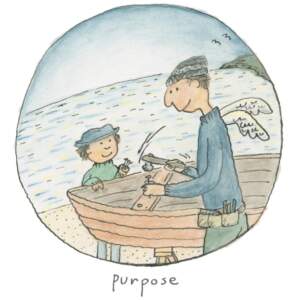Practitioner, Rohan Souter, describes spiritual care as the space where questions of meaning, identity, connection and belonging find a home.
When Rohan Souter walks into a room, he brings more than just his guitar and a folder of song lyrics. He brings presence. He brings curiosity. And he brings a deep reverence for human stories—especially those that are still unfolding.
Recently recognised with the Best of Care award at the Spiritual Care Australia National Conference, Rohan’s work as Bendigo Health’s Spiritual Care Practitioner in Mental Health is not only appreciated—it’s celebrated. The award honours excellence in spiritual care practice, and Rohan’s nomination was backed by heartfelt testimonials from colleagues and clients alike.
‘He’s one in a million,’ said one. ‘Rohan’s a legend,’ said another.
But behind the accolades is a story of a man whose path into spiritual care was anything but linear.
‘I was a country boy originally,’ Rohan reflects. ‘I’ve had a varied career—music, theatre, teaching. I taught English as a second language, worked with people with disabilities. But I always felt drawn to the personal and interpersonal growth of the people I worked with. That’s where the real stuff is.’
That ‘real stuff’ eventually led him into the world of spiritual care—a space where questions of meaning, identity, connection and belonging are not only welcomed, but central.
‘My earlier life was full of doubt and confusion,’ he says, ‘trying to understand my place in the world, human relationships, my inner landscape. Now I’m in a role that’s all about addressing people’s existential material.’
In mental health settings, those questions often come to the surface in raw and powerful ways.
‘People say, “I know who I was once upon a time, but all this stuff’s happened … and I’m in a place of great disillusionment.” My role is to gently hold space for those reflections. What’s brought you to this place of crisis? And what’s the potential for growth here?’
Rohan’s approach is deeply person-centred, and his practice is infused with humility, humour and heart. He’s not there to prescribe meaning, but to help people uncover their own.
‘I think when people hear “spiritual care” they expect the finger of God to come down at any moment,’ he laughs. ‘But I’m a very errant sheep, I suppose. My filter is my gut and my heart. If it feels right, I trust it.’
That openness is reflected in his use of Innovative Resources’ card sets—especially The Bears, Signposts, and Everyday Strengths.
‘They’re a key part of what I do each week,’ he says. ‘We usually start our groups with meditation—just observing thoughts and sensations. Then The Bears come out. They change the whole vibe in the room. They’re disarming, they don’t take themselves too seriously.’
Participants are invited to choose cards that reflect where they’re at, and then share—if they wish.
‘We’re not here to fix each other,’ Rohan explains. ‘We’re here to experience the magic that happens when we trust in our own capacity to unfold. The Bears help us do that. There’s no prescription.’
The sessions often end with Everyday Strengths, especially when tenderness is in the air.
‘They’re so affirming and safe,’ he says. ‘They help create a warm, nurturing feeling to close the group.’
Music also plays a central role in Rohan’s practice. Every Wednesday, he runs a music group in the acute unit.
‘We have songbooks, people choose a song, we sing, and they talk about why it’s relevant. Music taps into the whole person—the heart, the gut, the nervous system. It operates in that liminal space where the ordinary meets the extraordinary.’
He recalls a moment when a former patient approached him after a session.
‘He said, “I want to apologise. I wasn’t as evolved last time we met. I see things differently now.” Then he said something about the shape of my face and how he could tell I was evolved. It was just so beautiful. He was offering me a truer reflection of my esteem. That’s the kind of sacredness that can happen.’
Rohan’s pathway into spiritual care was shaped by his own journey and a commitment to personal growth. He completed Clinical Pastoral Education (CPE), a rigorous process involving hospital placements, peer reflection, and supervision.
‘It’s very deep work,’ he says. ‘It’s about developing awareness of Self and the capacity to sit with another person and honour their unfolding.’
At Bendigo Health, spiritual care is professionalised and integrated into the broader health system. Practitioners undergo the same induction as other staff and are selected based on their qualifications and CPE training. Rohan’s role is unique—he’s the only full-time spiritual care practitioner in the mental health unit, a position created and funded by the unit itself.
 ‘I have a lot of autonomy,’ he says. ‘I waltz in and out. I run groups, respond to referrals, and maintain a presence in the inpatient units.’
‘I have a lot of autonomy,’ he says. ‘I waltz in and out. I run groups, respond to referrals, and maintain a presence in the inpatient units.’
His collaborative approach is widely appreciated. He’s in regular contact with the Aboriginal Health Liaison team and works alongside colleagues from diverse religious backgrounds.
‘I always seek to promote spiritual care as an equal and essential partner in holistic health care.’
Rohan’s reflections on the broader mental health landscape are both poetic and provocative.
‘We’re meeting people at a place where the ordinary meets the extraordinary, where the “sane” meets the unexpected. If we had a more imaginative health system, would we be supporting people in more spiritual, emotional, creative ways?’
He sees the current mental health crisis as a symptom of a deeper societal malaise.
‘We live in a reductionist, materialistic society,’ Rohan says. ‘The one with the most toys wins. It’s ridiculous. But I see beautiful compassion every day. And I sing the praises of Bendigo Health—I feel supported and trusted here.’
Self-care is an ongoing journey for Rohan.
‘I’m doing pretty well with meditation at the moment,’ he says. ‘My wife’s a great exemplar—she meditates two hours a day. Nature helps too. When I take leave, I need time to decompress before I can really rest.’
Ultimately, Rohan’s work is about honouring the living human document—the person’s own story.
‘It’s not the Bible. It’s not the Koran. It’s the person’s narrative. And our capacity to be with that and honour it.’
In a world that often rushes to fix, Rohan Souter reminds us of the power of presence, the beauty of listening, and the healing that can happen when we simply hold space.
By John Holton
Featured resources:

